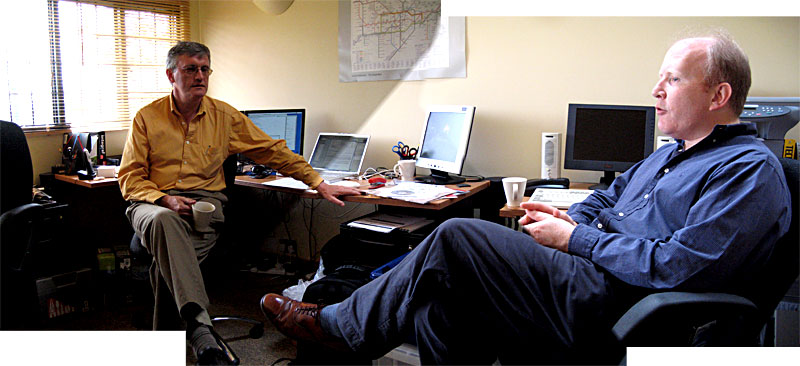
Real or artificial?

Spotted in the loo of a London restaurant.
1984: a bit delayed, but we’re getting there
This morning’s Observer column.
The future, as the novelist William Gibson observed, ‘is already here – it’s just not evenly distributed’. One place where it might be found is Mount Holly, Berkeley County, South Carolina. I’ve just flown over it (courtesy of Google Earth), and you’d never think it was a place where our destiny lies. The terrain is flat and wooded and includes some magnolia plantations. There’s a highway and what looks like a railway line (the image resolution isn’t great). The nearest town is Goose Creek, a settlement of 30,000 souls.
So why is this obscure spot a pivot of the universe?
Quote of the day
“The only known way to make software idiot-proof is to take away their computers.”
[Found on the web.]
Kurt Vonnegut
There’s a nice appreciation of Vonnegut by Christopher Bigsby on openDemocracy.net
Kurt Vonnegut, who died on 11 April 2007 at the age of 84, once said that he learned “bone-deep sadness” from his parents. He was 21 when his mother committed suicide and in Breakfast of Champions a character remarks “You’re afraid you’ll kill yourself the way your mother did.” He later confessed to himself being a monopolar depressive, even attempting suicide, insisting nonetheless that he was unashamed of the incident, which he would not repeat because he did not want to be “a two-time loser”. His father, he recalled, had said some of the funniest things he had ever heard but that he was “the saddest man I ever knew”. Perhaps Vonnegut’s humour, always with a dark underlay, was his response to a sense of spiritual vertigo. Certainly, the laughter in his work often comes through clenched teeth.
In person, he could come across as lugubrious, mixing melancholy with wit. In performance, he was a vaudevillian with a carefully honed act. He was an habitual smoker, believing it a treatment for his depression, but acknowledged the side-effects, one of which being that he set himself alight, causing serious burns. In the end, though, it was writing that proved the real therapy and as he remarked, “I don’t think you have to write that close to the truth about yourself in order to feel better. I think that writing detective stories, spy stories or whatever, is probably as therapeutic.” In his case the “whatever” would be science fiction…
Strangely, the Vonnegutweb hasn’t caught up with news of his death.
Annual miracle performed again

Our house is screened by a wonderful beech hedge. Every winter it withers and I’m convinced it’s died. Every spring I watch it like a hawk to see if it’s still alive. Then, one day, I forget to check and the next time I get home I discover that green leaves have appeared when I wasn’t looking. So it was today. The photograph looks odd because it’s got a detailed inset.
Zero plus zero equals… how much?

The latest statement from the only department store where I have a charge card. Why do they bother, I wonder? I’d prefer to know only when I owe them money. Wonderful things, computers.
Economist supports Sarkozy

No surprise there, then. The magazine has been of the opinion for as long as I can remember that France is a basket case, economically speaking. What the French need — according to the Economist — is a short sharp shock to jolt them out of their state-subsidised complacency. The editors clearly think Sarkozy is the man for the job.
Hmmm… This is the magazine that also supported George W. Bush for the presidency.
The conversation

Douglas and Quentin deep in conversation at Ndiyo yesterday.
Kurt Vonnegut R.I.P.
He’s gone, and we will miss him. The NYT obit captured his essence nicely.
To Mr. Vonnegut, the only possible redemption for the madness and apparent meaninglessness of existence was human kindness. The title character in his 1965 novel, “God Bless You, Mr. Rosewater, or Pearls Before Swine,” summed up his philosophy:
“Hello, babies. Welcome to Earth. It’s hot in the summer and cold in the winter. It’s round and wet and crowded. At the outside, babies, you’ve got about a hundred years here. There’s only one rule that I know of, babies — ‘God damn it, you’ve got to be kind.’ ”
Mr. Vonnegut eschewed traditional structure and punctuation. His books were a mixture of fiction and autobiography in a vernacular voice, prone to one-sentence paragraphs, exclamation points and italics. Graham Greene called him “one of the most able of living American writers.” Some critics said he had invented a new literary type, infusing the science-fiction form with humor and moral relevance and elevating it to serious literature.
He was also accused of repeating himself, of recycling themes and characters. Some readers found his work incoherent. His harshest critics called him no more than a comic book philosopher, a purveyor of empty aphorisms.
With his curly hair askew, deep pouches under his eyes and rumpled clothes, he often looked like an out-of-work philosophy professor, typically chain smoking, his conversation punctuated with coughs and wheezes. But he also maintained a certain celebrity, as a regular on panels and at literary parties in Manhattan and on the East End of Long Island, where he lived near his friend and fellow war veteran Joseph Heller, another darkly comic literary hero of the age.
Like many baby boomers, I loved his work. During a sojourn in the UK, he once said something very generous on TV about a newspaper column I had written, and one never forgets compliments from people like him.
